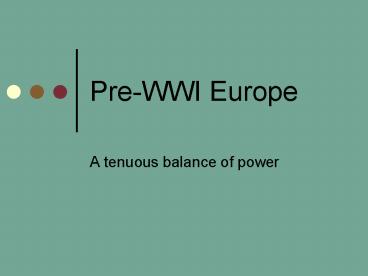Pre-WWI Europe PowerPoint PPT Presentation
1 / 19
Title: Pre-WWI Europe
1
Pre-WWI Europe
- A tenuous balance of power
2
Several underlying causes lead to WWI
- Domestic Issues of political social unrest
- Colonial conflicts (new imperialism)
- Nationalistic Motives
- Power Alignments (alliances)
- Armaments (militarism)
- International Crises (Morocco and the Balkans)
3
Domestic Uncertainty
- In general many countries were facing political
divisions between Left Wing socialists and
anarchists vs. an emerging Right that tended
towards nationalism and anti-Semitism - Both opposed the liberalism of the late 19th
century - Encouraged growth of a new Zionist movement and
desire for a native Jewish homeland
4
The Democratic Countries
- GB
- Tensions with Ireland
- Hostilities in House of Lords over social reform
programs like Old Age Pensions - Womens suffrage movement becoming militant
5
- France
- The 3rd Republic facing fight from Left and Right
to take down democracy - Lacked effective leadership
- The Dreyfuss Affair had the Assembly divided
- 1905 Separation of Church and State violent
uprisings - Labour problems
6
- Italy
- Though unified in 1860 was still quite divided
- Only 3 of population had suffrage rights
- The 50 years since unification had included
massive population growth and the country
couldnt manage - Martial law used to violently repress peasant and
industry uprisings - June 1914 a national strike. It took 100,000
soldiers and 10 days to restore order
7
The Autocratic Countries-- faced even more
uncertainty than the democracies
- Ottoman Empire
- Advanced state of dissolution internal
secession, violent despot, coup by Young Turks in
July 1908 lead to Turkification - Ongoing unrest created a weak nation by 1911
Italy occupied Libya Greece, Bulgaria and Serbia
formed the Balkan League Albania was
independent Macedonia was partitioned - The Ottoman Empire is essentially eliminated
8
- Russia - you know the story
- Tsar is struggling to maintain order
- Challenges of modernity
- Young intellectuals questioning the autocratic
system - Revolutionary groups mounting
- 1905 Bloody Sunday
- October Manifesto to Fundamental Laws
- Suspended Dumas
9
- Austria-Hungary
- Intense nationalism fraught with ethnic tension
- Challenges and lack of unity in combined Austrian
and Hungarian armies - Hungary wants out of dual monarchy
- Austrian side had 30 ethnically based political
parties ? parliament at a standstill
10
- Germany
- Had a parliament but it was answerable to the
Kaiser - Prussia, the most reactionary region of country
had a dominant influence - Even under Bismarcks reforms, there was growing
dissent and strengthening of Socialist and
Catholic Center parties - Intense labour militancy
- Increased calls for parliamentary system
11
- Germany contd
- When Bismarck was dismissed as Chancellor by
Kaiser Wilhelm II, both domestic and
international deterioration increased - Weltpolitik increase navy, acquire colonies,
gain power amongst the Great Powers created
international tensions and impacted alliances
12
New Imperialism
- By mid 18th Century empire building had slowed
but 1880-1905 there was unprecedented imperialism
(European powers subjugated 50 of the worlds
non-European population) - Massive migration b/w 1840 and 1914 30-35
million Europeans moved overseas - Search was for new wealth and potential markets
in Asia and Africa - Refer to New Imperialism sheet for additional
motives
13
(No Transcript)
14
Nationalistic Motives
- Empire building (via imperialism) was largely
motivated by nationalist desires. Prove your
power and worth, and therefore, superiority. - Bitter rivalries formed b/w the Great Powers.
15
Power Alignments
- Refer to Bismarck summary sheet for much more
detail - 1882 Triple Alliance Ger, A-H, Italy
- 1904 Br and Fr, Entente
- 1907 Anglo-Russian Entente
16
(No Transcript)
17
Militarism / Armaments
- Hague disarmament conferences of 1899 and 1907
fail - Between 1875 and 1914 Germany increased arms
spending by 230, Britain by 189 and France by
109 - GB and Germany in naval race from 1890
(Dreadnoughts)
18
Nation of aircraft in 1914 Size of Army in 1914 of soldiers who fought in war
Austria-Hungary 34 3 million 7.8 million
Britain 110 975 000 8.9 million
France 160 4 million 8.4 million
Germany 246 4.5 million 11 million
Russia 300 6 million 12 million
United States 200 000 4.4 million
19
International Crises
- Moroccan Crises
- 1905 and 1911
- Balkan Crises
- 1908 and 1914
Which leads us to Franz Ferdinand

